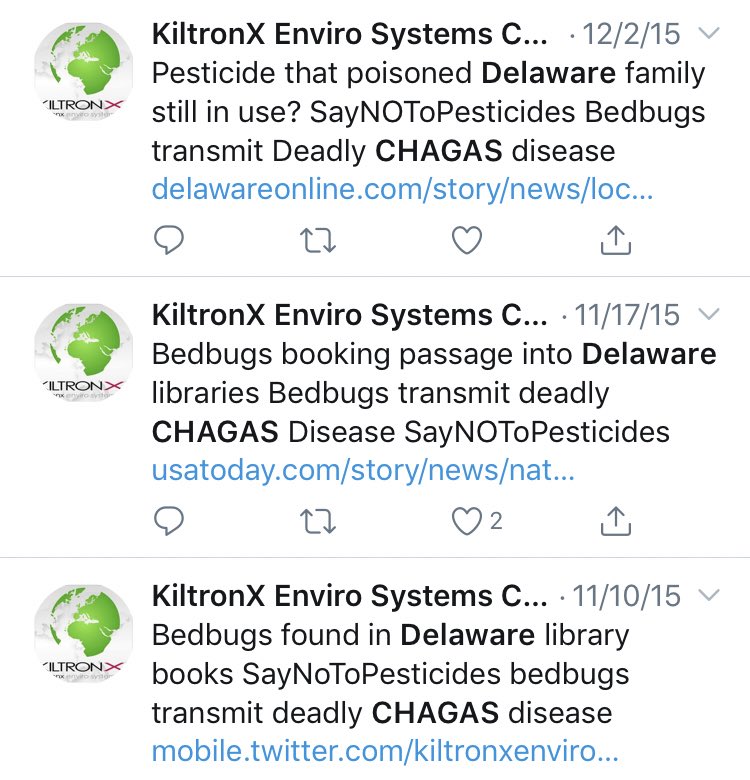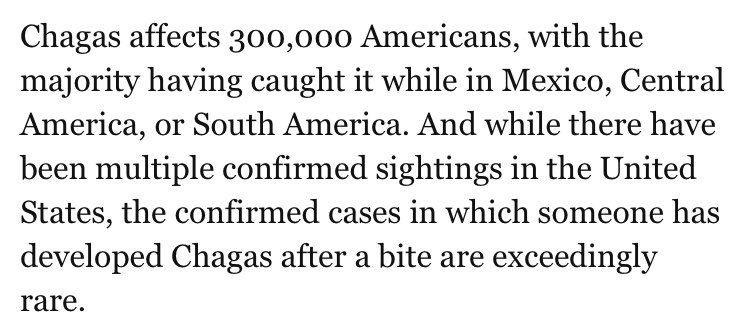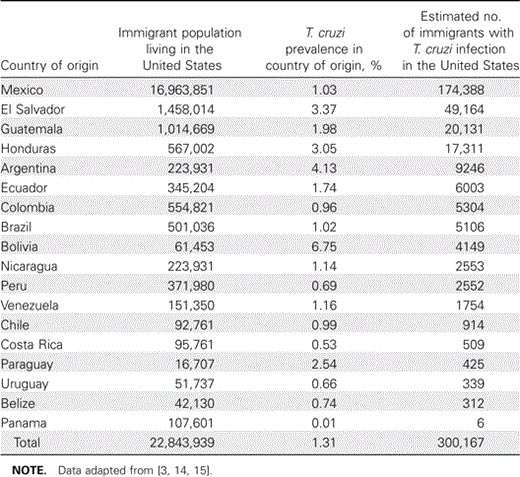This great interview on kissing bugs in Delaware made me wonder about the source of all this recent kissing bug news. @WhatDoBirdsEat seemed to be scratching her head at the beginning over why this is news. So I did some digging, and fell into a weird wormhole. Come along! https://twitter.com/DETickTalk/status/1125898395959406593
First, it seems to be news because of this “report” on April 19. I’m not sure what MMWR is, but it seems... strange. https://www.cdc.gov/mmwr/volumes/68/wr/mm6815a5.htm
The coverage of this article then gained momentum over the next few days. Perhaps the most irresponsible bit of the coverage (and the report itself) is the emphasis on Chagas Disease in this context- the disease is not an issue in Delaware. When/how did this happen?
Well, the first Twitter mention of Chagas and this article is from this odd company called KiltronX Enviro Systems. They sell a nonsense product to control bed bugs. As far as I can tell, they are selling people soybean oil as “green engineered” “cutelin”. Awful.
Here are some instructions that clearly show soybean oil is the “active ingredient” behind their claims. Their ads on their website are even worse: someone randomly says “Cutelin Science!” in one, which is not a thing. https://cdn.shopify.com/s/files/1/0144/5920/7734/files/KiltronX_Product_Instructions.pdf
You may have noticed from their tweet above that though they link to that article about kissing bugs, they are focused on the claim bed bugs can transmit Chagas Disease. They have been making this claim for some time in notably-cobbled, buzz-word filled tweets.
They may to be hyping a study that @bug_gwen wrote about here: https://www.wired.com/2014/11/bed-bugs-wont-give-chagas-disease-probably/amp Essentially, just because something can theoretically happen doesn’t mean it will happen in real conditions.
This seems to be an attempt by this company to exploit fears of Chagas Disease and bed bugs to sell oily sheets. Why then, would they want to tie their product to a tropical parasitic disease that is *very rarely* transmitted in the entire United States?
This brings me to some of the other tweets that pop up when you search for “Delaware” and “Chagas Disease”. This old one gets referenced: https://twitter.com/ingrahamangle/status/1033847289545154560?s=21
Similar sentiments are expressed in this article: https://www.breitbart.com/politics/2019/04/24/cdc-confirms-first-known-kissing-bug-sighting-in-delaware/
These two points seem to be behind the racist argument: 1) an estimated 300,000 Americans have Chagas Disease that 2) they caught while in Mexico, Central America or South America.
Where did this first number come from? It is all over CDC documents and papers talking about Chagas Disease. It is a ten year old (seems due for an update  ) calculation looking at the number of immigrants from countries with Chagas Disease- see Table 1. https://academic.oup.com/cid/article/49/5/e52/311314
) calculation looking at the number of immigrants from countries with Chagas Disease- see Table 1. https://academic.oup.com/cid/article/49/5/e52/311314
 ) calculation looking at the number of immigrants from countries with Chagas Disease- see Table 1. https://academic.oup.com/cid/article/49/5/e52/311314
) calculation looking at the number of immigrants from countries with Chagas Disease- see Table 1. https://academic.oup.com/cid/article/49/5/e52/311314
You may have missed the implication in the quote above that “while in Mexico, Central America or South America” meant “before immigrating from Mexico, Central America or South America”, but I’m not sure your average  viewer would have. http://video.foxnews.com/v/1663606504001/
viewer would have. http://video.foxnews.com/v/1663606504001/
 viewer would have. http://video.foxnews.com/v/1663606504001/
viewer would have. http://video.foxnews.com/v/1663606504001/
Chagas Disease is a bogeyman for these outlets because it has some characteristics that lend itself to racism. In the US, it fits with the- let me be clear- absolutely racist narrative above about immigrants bring diseases into our country.
The irony to all of this Chagas Disease commotion is that since transmission is so very rare in the United States, immigrants with Chagas Disease present effectively no risk of passing the parasite to other people.
I am not even the first entomologist to point out Chagas Disease is being exploited for racist means. https://twitter.com/Myrmecos/status/671378282420568064?s=20
A more relevant question when faced with the staggering statistic above is how do we better understand and address issues faced by those who may have this chronic disease. I would be wary of any press coverage of this disease framed around unrealistic transmission in the US.
This seems to be an example of how a pseudoscience business and racism can work together to amplify an irresponsible message for their mutual benefit. 


 Read on Twitter
Read on Twitter






